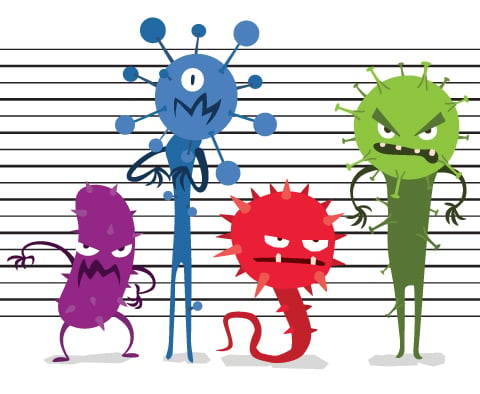Prostatitis
Prostatitis is an inflammation of the prostate gland. It is often painful and can cause frequent urination, difficulty urinating, or a burning feeling while urinating. You may feel pain in the genital area, groin, lower abdomen or lower back. Prostatitis is sometimes, but not always, caused by bacteria. It is one of the most common diseases seen in urology practices in the United States, accounting for close to two million visits every year.
There are two types of bacterial prostatitis – acute and chronic. The acute type happens suddenly and lasts a short time. Chronic prostatitis develops slowly and can last a long time, even years. The symptoms are similar for both.
There is also a nonbacterial form of prostatitis that is often called chronic pelvic pain syndrome. The cause for this is unknown, although some research suggests that a bug of some sort (not bacteria) may be responsible.
Prostatitis Symptoms
Common symptoms include:
- Pain in the genital area (groin, penis, testes)
- Pain in the lower back
- Urgent, frequent urination
- Pain or burning while urinating
- Difficulty having an erection or painful ejaculation
- Blood in the urine
- Fever, chills, muscle aches, and other flu-like symptoms (with acute bacterial prostatitis)
MicroGenDX Tests Used in Diagnosing Prostatitis
Many different types of bacteria can cause prostatitis, and sometimes no bacteria are involved. A urinalysis is often used to diagnose prostatitis. However, a urinalysis can miss the bacteria completely and you may get the wrong diagnosis.
A MicroGenDX test detects the DNA of all microbes in your urine sample, along with how much of each is present, and uses that information to identify the cause of your prostatitis and the drugs that can best treat it. It is important to know that not all antibiotics work for all bacteria, and some even work differently in different areas of the body. Your doctor should consult the "antimicrobials for consideration" chart on your MicroGenDX report to decide what antibiotic is right for you. The test can also help determine if your prostatitis is nonbacterial.
You can order a MicroGenDX “MensKEY” test and get complete sampling instructions here:
https://microgendx.com/product/mens-complete-urine-semen-dm-intl/
Providing Samples for the Prostatitis Test
You will need to provide both a urine sample and a semen sample for this test. It’s very important to obtain proper samples by following the instructions for collecting the samples, as well as when packaging and shipping them.
Everything you need to know about taking the samples is included in with your test, and is also available online on the product page. The instructions contain illustrations that will help you collect the samples without contaminating them. For example, you should take the urine and semen samples on the same day, and you will need to wash your hands thoroughly and clean your genital area with soap and water first, so that bacteria on the skin aren’t included in your sample.
Medical Specialties Treating Prostatitis
Prostatitis is treated by a primary care physician or a urologist.
How Prostatitis is Treated
Both chronic and acute bacterial prostatitis are treated with antibiotics. Chronic bacterial prostatitis is often treated for six weeks or more. Acute bacterial prostatitis is treated for at least 30 days, and sometimes as long as six months to prevent a recurring infection. It is important to complete the full course of medication as it is prescribed, even when symptoms begin to clear up before you are treated.
Some bacteria that cause prostatitis can develop resistance to specific antibiotics, so that they cannot be effectively treated with those antibiotics. This is why all MicroGenDX diagnostic tests include detection of antibiotic resistance genes in your sample, and then provide alternative antibiotics for your doctor to consider prescribing to you.
If your test reveals no infection, then nondrug therapy, pain relievers, or muscle relaxants may be prescribed.
References
- https://familydoctor.org/condition/prostatitis
- https://www.medscape.com/answers/785418-60722/what-is-the-prevalence-of-prostatitis-in-the-us#:~:text=Autopsy%20studies%20have%20 revealed%20a,%2D95%25%20of%20prostatitis%20cases
- https://www.mayoclinic.org/diseases-conditions/prostatitis/symptoms-causes/syc-20355766#:~:text=Prostatitis%20is%20a%20disorder%20 of,not%20all%20cases%20of%20prostatitis
- https://www.niddk.nih.gov/health-information/urologic-diseases/prostate-problems/prostatitis-inflammation-prostate
- https://www.merckmanuals.com/home/men-s-health-issues/benign-prostate-disorders/prostatitis

